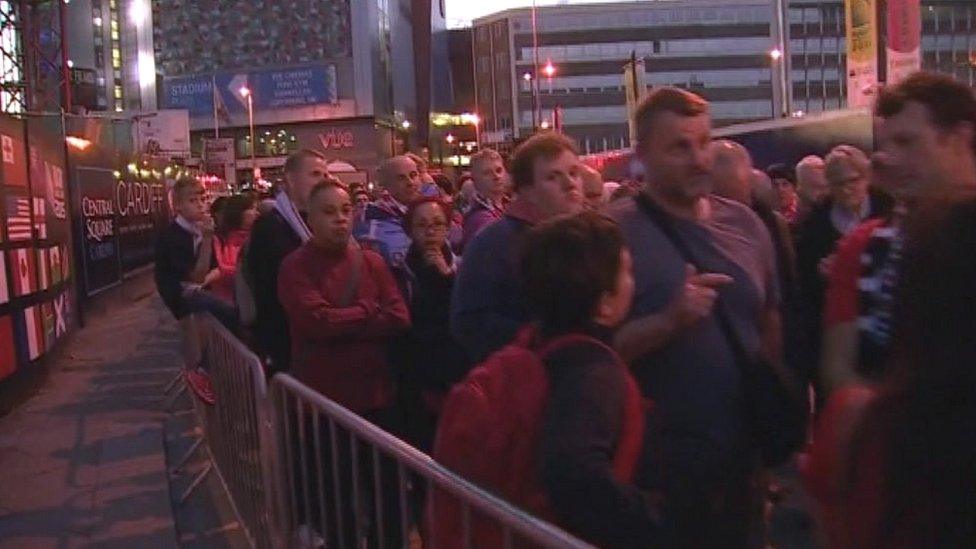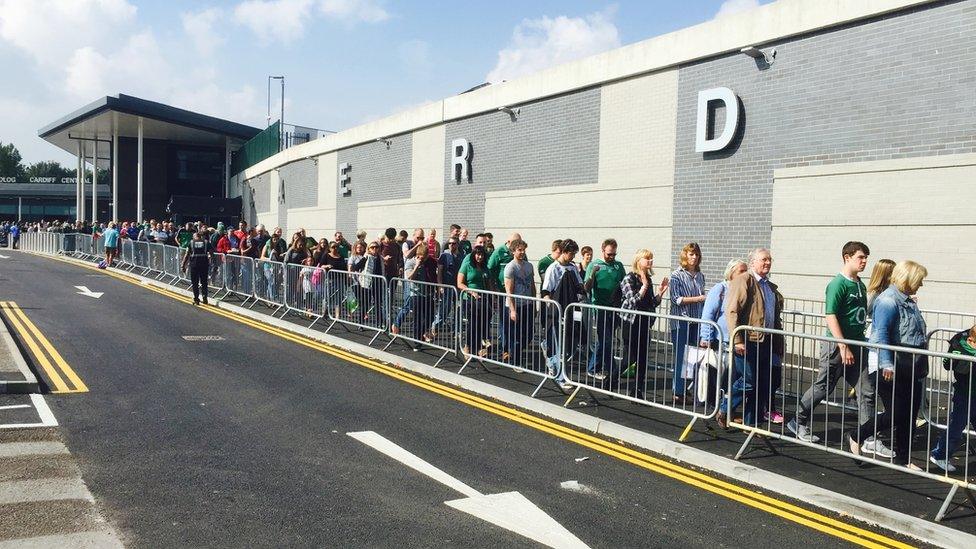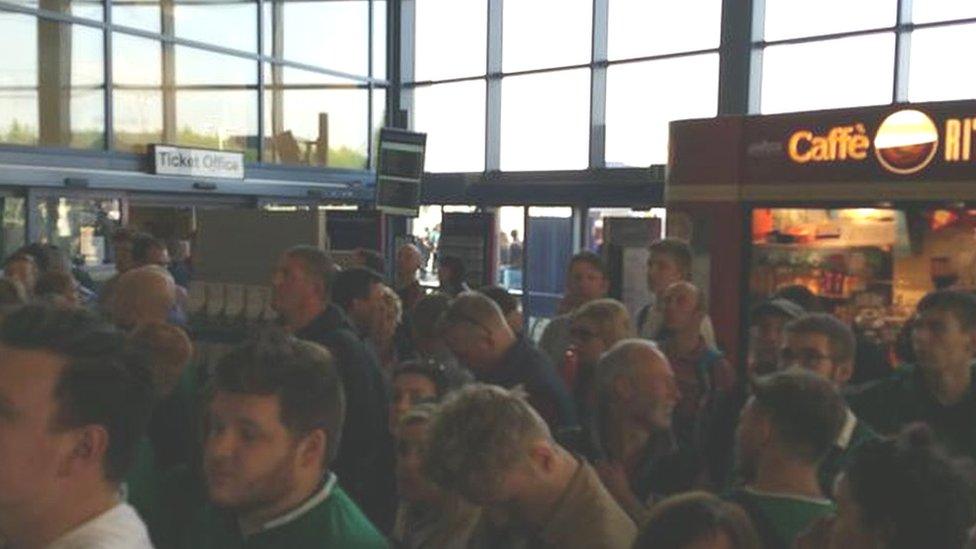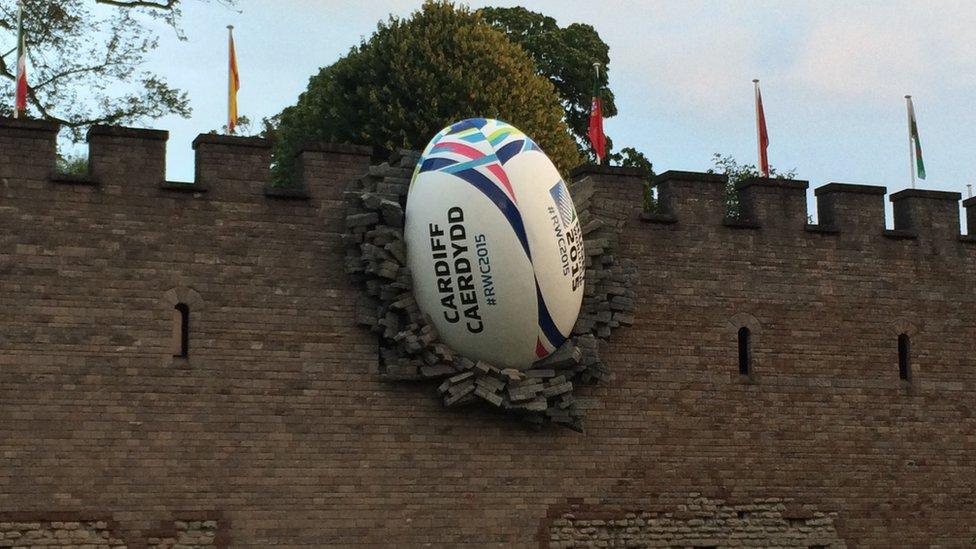Cardiff Rugby World Cup train delays 'unacceptable'
- Published

Queue arrangements in Cardiff were working better by the time Wales played Fiji on 1 October
Thousands of Rugby World Cup fans who came to Cardiff by train had an "unacceptable" experience due to delays leaving, event organisers have said.
People waited up to four hours for trains home after the first two games at the Millennium Stadium in September.
Head of tournament services Mick Wright said he saw for himself fans in distress, fearing a crush, in queues following the Australia v Fiji game.
But he praised rail operators for their responses to post-match problems.
The Football Association of Wales (FAW) warned it would be "horrendous" if there were such problems at the Uefa Champions League final in Cardiff in 2017.
England 2015 organising team members expanded on written evidence, external to the assembly's business and enterprise committee, which held an inquiry into the transport chaos on Thursday.
Of the tournament's 48 matches, the only ones which saw post-match transport problems were the first three of the eight games to be staged in Cardiff, AMs were told.
Tournament organisers highlighted "unacceptable" queue arrangements for matches at the Millennium Stadium on the 19 and 20 September - Ireland v Canada and Wales v Uruguay.
Queues for trains outside Cardiff Central station took three to four hours to clear on both days, with problems also at London Paddington before the games, organisers said.
Mick Wright of RWC 2015 says he saw fans in distress fearing a crush
Mr Wright said tournament organisers were reluctant to warn fans to expect similar delays when Australia played Fiji in Cardiff on 23 September.
"In Cardiff there has been an assumption that it's ok to ask an audience to wait for three to four hours," he told the committee.
"I can tell you my response that day was we would not do that because that is not acceptable."
Mr Wright, who witnessed the crowds after the Australia v Fiji game himself, said the queuing system was "non-existent" outside the forecourt to the station, causing distress because "it looked like there was a crush".
However, Mr Wright said the fans were "pretty orderly" and he praised rail operators for their responses to long queues.
Great Western Railway had apologised for underestimating passenger numbers for the first game in Cardiff, calling the situation "embarrassing", and £600,000 was spent on shuttle buses to take fans to Bristol to catch trains to London following initial problems.
Mr Wright had praise for Cardiff's role in hosting games, saying that "the fan-zone was absolutely amazing, the stadium performed as we knew it would and the city was one of the best we had in the tournament".
Earlier, committee member Lord Elis-Thomas told the hearing he thought Cardiff Central Station was "totally inadequate" for a capital city.
Lord Elis-Thomas said the tournament showed the limitations of Cardiff Central station
Claire Moggridge, operations manager for major projects at Cardiff council, agreed, adding: "It is vital that we get a train station that has the capacity within it to deal with the crowds."
Ch Supt Josh Jones from South Wales Police said Cardiff was "a superb city to host events" but there were "always things that can be improved".
Rugby World Cup organisers have made a series of recommendations for future major events.
They include suspending freight train movements through Cardiff Central station for three hours after matches, as well as better train boarding and queuing procedures.
Alan Hamer, who is in charge of transport for the FAW in the run up to the Champions League final in Cardiff, said there were written commitments that train services would not be disrupted in the week of the match to help avoid "horrendous" problems.
He told BBC Radio Wales Uefa were in Cardiff observing the Rugby World Cup quarter finals and how the transport system worked for those matches.
Speaking after the meeting, committee chairman William Graham said: "It is clear to us that the root problem here is the aging infrastructure at Cardiff Central station.
"There is a need for substantial investment in the station to create a station fit for the 21st century, and the expectations of today's passengers."
- Published23 September 2015

- Published19 September 2015

- Published18 September 2015
